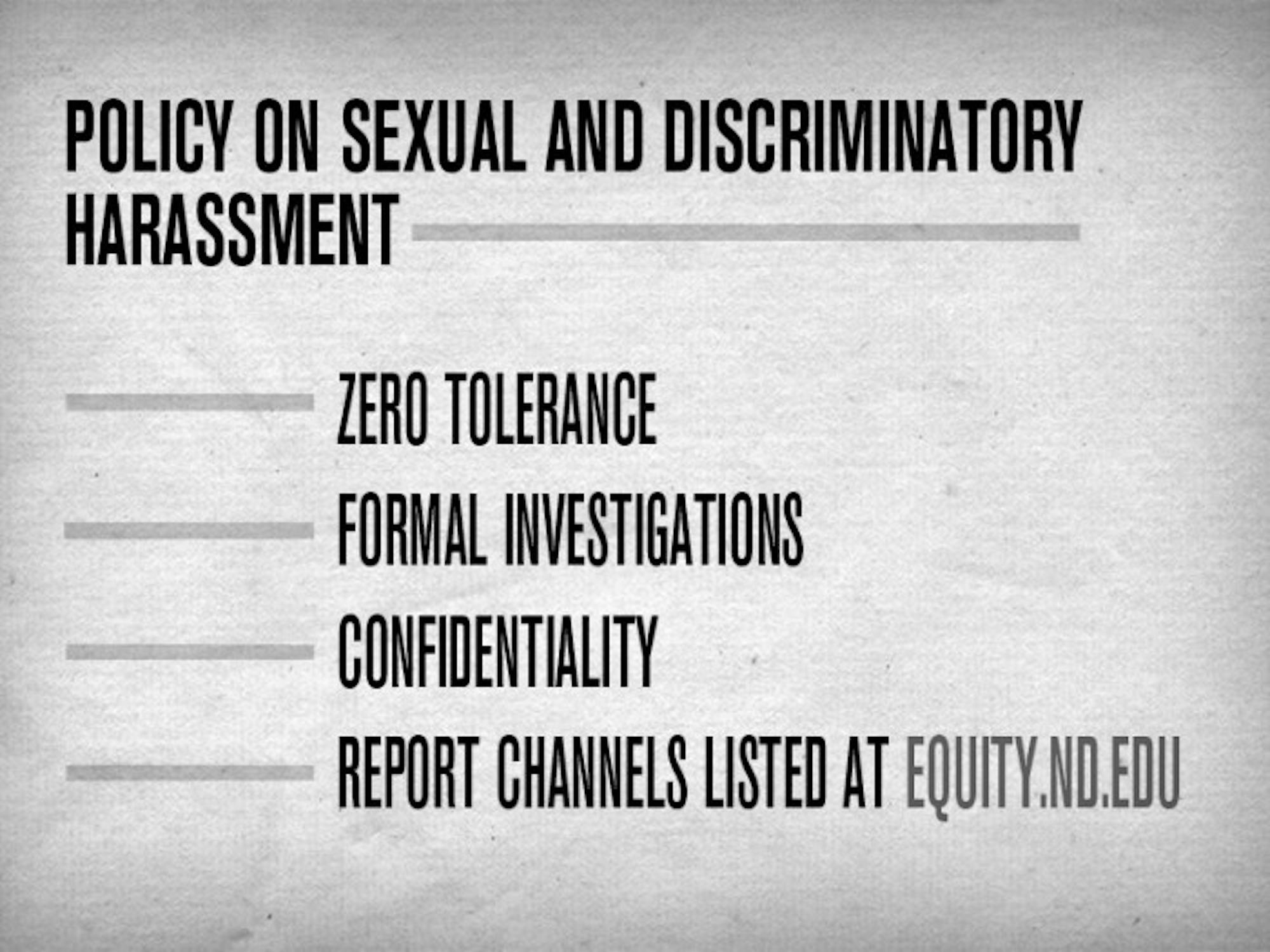In an attempt to streamline treatment of sexual and discriminatory harassment, the Office of Institutional Equity published revisions to the University’s “Policy on Sexual and Discriminatory Harassment” in late December.
“This is an overarching policy that applies to everyone at the University that says we have no tolerance for instances of sexual or discriminatory harassment,” Sarah Wake, director of the Office of Institutional Equity, said. “It is also a general policy statement about what the University expects of every member of this community.”
The policy applies to students, faculty and staff members, but the “du Lac” student handbook, and not the “Policy on Sexual and Discriminatory Harassment,” governs student-on-student sexual harassment.
The revised policy combines two previous policies: one on sexual harassment and one on discriminatory harassment, Wake said. She said the sexual harassment policy largely mirrored the student-on-student sexual harassment policy in “du Lac,” whereas the discriminatory harassment policy contained some different procedures.
“There wasn’t as specific of a time frame, it wasn’t as clear I think who to contact and what the process was,” Wake said. “By condensing the two policies … we have the same policy and procedure governing both sets of conduct.
“It also shows that we take discriminatory harassment just as seriously as we take sexual harassment. They’re treated the same way, they’re investigated in the same way, they have the same time frames involved. It shows to me that they’re treated on equal footing here and that we’re committed to having a zero tolerance policy for both types of harassment.”
The revised sexual and discriminatory harassment policy eliminates the option of proceeding informally to attempt to resolve a case. Wake said under the previous policies, a department of the University could conduct its own investigation about an instance of alleged harassment. She said this informal procedure was troublesome because different departments used distinct processes and sometimes reached different outcomes.
“We want these to be treated consistently … across campus, so we want to know that all of our students, all of our faculty and all of our staff who are ever making a complaint, that they know that they can trust in the process and that they’ll get a consistent result any time that they come forward,” Wake said.
The revised policy provides students with two options to make complaints: communicating directly with the alleged defender or undergoing the University resolution process. Wake said this new set of options provides consistency among cases of alleged harassment.
“It allows us to track what’s going on on campus,” she said. “Before, if things were handled informally, we might not ever know, someone at the University might not ever know, that in a given department there was whatever complaint. … Now, with this process, … we’re going to have an accurate picture of where potential problems might be and where we might need to do more, to conduct additional training or make people more aware of a policy and of what the University expects.”
The “Policy on Sexual and Discriminatory Harassment” also states that the University aims to complete investigations of complaints within 60 calendar days of the initial report, as opposed to the 60 business days mentioned in the previous, separate policies.
A provision of the revised policy ensures the confidentiality of people who report instances of harassment. A separate provision protects them against retaliation.
“When [University President Fr. John Jenkins] speaks about these issues, he says that it never serves Notre Dame to keep issues like this quiet,” Wake said. “We want people to come forward, and we want people to feel comfortable, not only with the process, but with people here at the University who are designed simply to help deal with situations like this.”
Wake said her office recently redesigned its website, equity.nd.edu, to make clearer the avenues through which people can report harassment. She said policies regarding sexual and discriminatory harassment also have become more integrated into faculty and staff orientation programs.
Additionally, Wake said so far in the 2013-14 academic year, her office has received four times as many complaints of sexual or discriminatory harassment involving a staff member as it did in the entire 2012 calendar year.
“I just think there’s been a huge renewed commitment to making sure people are aware of and understand these issues,” Wake said.
Although the student-on-student sexual harassment policy outlined in “du Lac” is not currently up for revision, Wake said the University is conducting focus groups with students and is open to considering improvements that could be made to the “du Lac” policy in the future.
Wake said she hopes the revisions to the “Policy on Sexual and Discriminatory Harassment” help people to understand the avenues through which students, faculty and staff can report issues or receive guidance.
“I hope that people also gain confidence in the process, that if I come forward, I’m always going to be treated with respect,” Wake said. “I’m going to have a fair process, it’s going to be a prompt process, it’s going to be a thorough process, and at the end of the day, that they feel the resolution is fair.”













